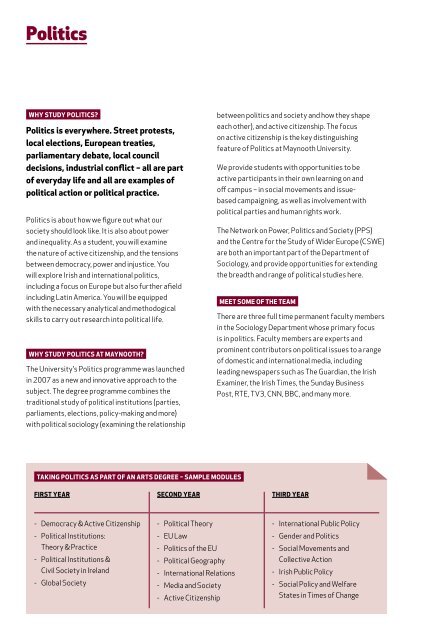Maynooth University Undergraduate Handbook 2015
Maynooth University Undergraduate Handbook 2015
Maynooth University Undergraduate Handbook 2015
You also want an ePaper? Increase the reach of your titles
YUMPU automatically turns print PDFs into web optimized ePapers that Google loves.
Politics<br />
Subject Areas at <strong>Maynooth</strong> <strong>University</strong> 136 – 137<br />
Why study Politics<br />
Politics is everywhere. Street protests,<br />
local elections, European treaties,<br />
parliamentary debate, local council<br />
decisions, industrial conflict – all are part<br />
of everyday life and all are examples of<br />
political action or political practice.<br />
Politics is about how we figure out what our<br />
society should look like. It is also about power<br />
and inequality. As a student, you will examine<br />
the nature of active citizenship, and the tensions<br />
between democracy, power and injustice. You<br />
will explore Irish and international politics,<br />
including a focus on Europe but also further afield<br />
including Latin America. You will be equipped<br />
with the necessary analytical and methodogical<br />
skills to carry out research into political life.<br />
Why study Politics at <strong>Maynooth</strong><br />
The <strong>University</strong>’s Politics programme was launched<br />
in 2007 as a new and innovative approach to the<br />
subject. The degree programme combines the<br />
traditional study of political institutions (parties,<br />
parliaments, elections, policy-making and more)<br />
with political sociology (examining the relationship<br />
taking politics as part of an arts degree – Sample modules<br />
between politics and society and how they shape<br />
each other), and active citizenship. The focus<br />
on active citizenship is the key distinguishing<br />
feature of Politics at <strong>Maynooth</strong> <strong>University</strong>.<br />
We provide students with opportunities to be<br />
active participants in their own learning on and<br />
off campus – in social movements and issuebased<br />
campaigning, as well as involvement with<br />
political parties and human rights work.<br />
The Network on Power, Politics and Society (PPS)<br />
and the Centre for the Study of Wider Europe (CSWE)<br />
are both an important part of the Department of<br />
Sociology, and provide opportunities for extending<br />
the breadth and range of political studies here.<br />
meet some of the team<br />
There are three full time permanent faculty members<br />
in the Sociology Department whose primary focus<br />
is in politics. Faculty members are experts and<br />
prominent contributors on political issues to a range<br />
of domestic and international media, including<br />
leading newspapers such as The Guardian, the Irish<br />
Examiner, the Irish Times, the Sunday Business<br />
Post, RTE, TV3, CNN, BBC, and many more.<br />
First year Second year Third year<br />
Head of the Sociology Department (the home of Politics at<br />
<strong>Maynooth</strong> <strong>University</strong>), Professor Mary Corcoran<br />
Dr. Mary Murphy graduated from TCD in 1986<br />
with a BA in Economics and Sociology. Mary has<br />
worked as a campaigner and policy analyst in<br />
antipoverty and labour market NGO’s for 15 years,<br />
among other areas. Mary returned to academic<br />
research in 2002 and graduated with PhD from<br />
DCU in 2006, taking up her present position in<br />
<strong>Maynooth</strong>’s Sociology Department in 2007.<br />
Mary’s research interests include political<br />
economy, social politics, globalisation, welfare<br />
states, social security, activation, gender, poverty,<br />
political sociology, power and civil society.<br />
What can I do with my degree<br />
Politics students acquire useful skills such as the<br />
ability to understand topical issues, investigative<br />
and research capabilities, and strong communication<br />
skills – opening up a wide variety of career options.<br />
̍̍<br />
Democracy & Active Citizenship<br />
̍̍<br />
Political Institutions:<br />
Theory & Practice<br />
̍̍<br />
Political Institutions &<br />
Civil Society in Ireland<br />
̍̍<br />
Global Society<br />
̍̍<br />
̍̍<br />
̍̍<br />
̍̍<br />
̍̍<br />
̍̍<br />
̍̍<br />
Political Theory<br />
EU Law<br />
Politics of the EU<br />
Political Geography<br />
International Relations<br />
Media and Society<br />
Active Citizenship<br />
̍̍<br />
International Public Policy<br />
̍̍<br />
Gender and Politics<br />
̍̍<br />
Social Movements and<br />
Collective Action<br />
̍̍<br />
Irish Public Policy<br />
̍̍<br />
Social Policy and Welfare<br />
States in Times of Change<br />
While some graduates may enter electoral and<br />
party politics, many more will work in areas such as<br />
public policy, the media, international affairs, the<br />
European Union, human rights, community work,<br />
political activism and business and management.<br />
Dr. Mary Murphy


